Author: everbella
Have a Happy (and Healthy) Thanksgiving
Thanksgiving is coming! I don’t know about you, but I am so excited. I love this holiday – the family time, the food, sharing gratitude and appreciation… It’s just the best!
However, I know that sometimes, the holidays can bring a little stress. Especially when it comes to food and making healthy choices. Most people think that their healthy diet and the holidays aren’t the most compatible. And while it’s true that the parties, family gatherings, and celebrations may create some challenges, there are many ways to navigate the holiday season all while maintaining a perfectly balanced diet.
So, let me show you how you can make it through this Thanksgiving, healthy and stress free!
Thanksgiving Turkey Trot
Get active! There is no better way to start Thanksgiving day than to find some way to be active before the big meal. And no, it’s not because you need to burn off extra calories before dinner (one meal won’t hurt you). It’s because physical activity has some amazing benefits, which will leave you feeling energized and ready to enjoy the day!

Regular exercise reduces our risk of chronic disease, it keeps our bones and joints healthy, it can be good for our mental health, and it even has a large role in keeping us energized throughout the day. [1-7]
So, to start your Thanksgiving holiday off right, by signing up for a Turkey Trot 5K run! Or, maybe encourage your family and friends to join you for a walk outside. You can even get activity in by playing games, like corn-hole or a friendly game of flag football!
Get Yourself a Plate
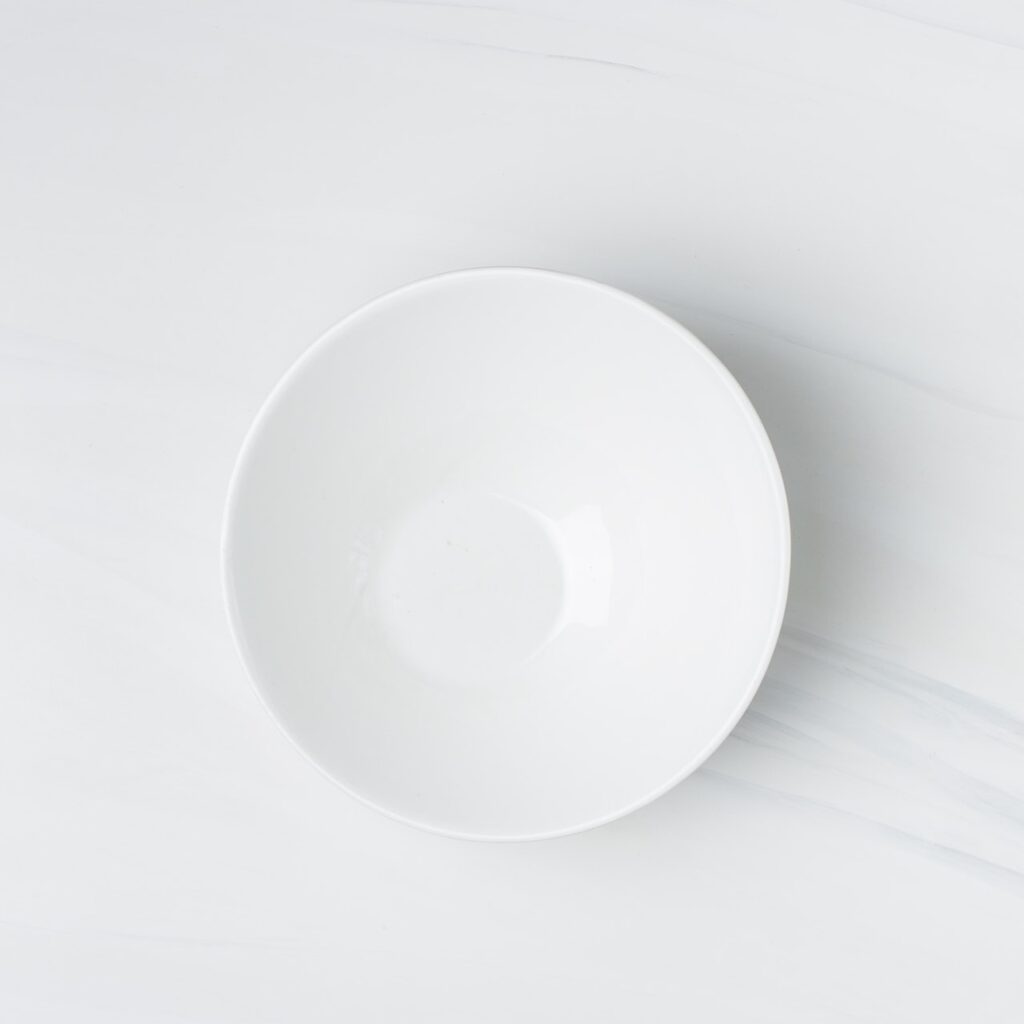
Sometimes, Thanksgiving can feel like an endless day of eating. Breakfast is followed by snacks, and appetizers, the main courses, and of course, you have to squeeze in a slice of pie (or two). I find that I’m usually stuffed by noon!
However, one of the most effective ways to prevent overeating is to be mindful of portion sizes. It can be easy to graze and snack all day, however, you may find yourself eating two, three, or even four times the portion size without realizing it!
Standard portion sizes are as follows:
Nuts: ¼ cup
Cheese: 1 oz (about 1 slice of cheese)
Chips/Crackers: varies, depending on the type – check out the nutrition label for the individual portion size!
Dips: usually about 1-2 tbsp
Meat/Protein: 3 oz (about the size of the palm of your hand)
Veggies: 1 cup raw, or ½ cup cooked
Fruits: 1 cup raw, or ½ cup cooked
Alcohol: 12 oz of beer (standard 5% ABV), 5 oz of wine, 1.5 oz of liquor – 1 drink for women, 2 drinks for men
While each of these measurements reflects one single portion size, it does not mean that you always need to limit yourself to one portion. You may serve yourself more or less! For example, while snacking on appetizers, it is completely acceptable to portion out 2 oz of cheese (2 serving sizes) + 1.5 oz of salami (½ the serving size) + 1/2 cup of apple slices (½ the serving size). See what I mean?
So, grab a plate, serve yourself what you think you’ll eat, and enjoy your time!
Practice Mindfulness

Have you ever practiced mindful eating? If not, Thanksgiving is a great day to start. Simply put, mindful eating is the acknowledgement of, and attention to, feelings around food choices, and feelings of hunger and fullness during mealtimes. Rather than gobble up your food quickly without thinking (turkey pun intended), you can practice a few techniques to help you be more mindful during Thanksgiving dinner.
- Start by giving thanks! Remind yourself why you’ve gathered with friends and family on this day, and what you are thankful for. This is a great start to the mindful eating process, and will get you in the right mindset.
- Slow down. Mindful eating can help us tap back into important appetite cues that tell us, “Eat! You’re hungry!” or “Stop eating, you feel satisfied!”. It can be hard to listen to feelings of hunger and fullness when we aren’t really paying attention. One way to pay better attention to those feelings – slow down and enjoy your food.
- Use your senses. We register food enjoyment with our senses. Smell, taste, touch, sight, and even hearing! When you slow down your pace of eating, it can allow you to spend more time being mindful about how your meal impacts your senses, beyond just taste. This can also encourage greater appreciation for the flavor and quality of the meal you’re eating. Savor every bite like it’s your last!
- Remove distractions. One of the biggest barriers to mindful eating is distraction, particularly, electronic distractions. So, put those screens away. Place your phone in the other room while you eat. Enjoy time with family and friends!
Practice Flexibility this Thanksgiving

When it comes to Thanksgiving dinner, there are plenty of ways to make healthy choices! However, let’s note that while we should all aim for a wholesome, healthy diet, it’s also important to find balance in our choices. While we don’t choose pumpkin pie for its nutritional value, we might choose it because it makes us feel good. It might be part of a Thanksgiving tradition! Pumpkin pie might be the one dish you look forward to all year. Ultimately, food may have value, aside from its nutritional value, and that is just as important to consider when we make healthy choices.
I never want to feel guilty about the foods I eat on special days, like Thanksgiving. I grant myself permission to be flexible. And you should too! Thanksgiving only comes once a year, and we all deserve the chance to enjoy the day to its fullest. However you choose to spend your Thanksgiving this year, I hope it is filled with delicious food, quality time, and happy memories. I wish you the happiest Thanksgiving; I am so grateful for you, your support, and your trust. Now, let’s eat!
Citations
- Myers, Jonathan. “Exercise and Cardiovascular Health.” Circulation, vol. 107, no. 1, 2003, https://doi.org/10.1161/01.cir.0000048890.59383.8d.
- “Exercising to Relax – Harvard Health Publishing.” Harvard Health, 7 July 2020, https://www.health.harvard.edu/staying-healthy/exercising-to-relax.
- “More Evidence That Exercise Can Boost Mood.” Harvard Health, 1 May 2019, https://www.health.harvard.edu/mind-and-mood/more-evidence-that-exercise-can-boost-mood.
- Guszkowska, Monika. “Wpływ ćwiczeń fizycznych na poziom leku i depresji oraz stany nastroju” [Effects of exercise on anxiety, depression and mood]. Psychiatria polska vol. 38,4 (2004): 611-20.
- Toni Golen, MD, and MD Hope Ricciotti. “Does Exercise Really Boost Energy Levels?” Harvard Health, 1 July 2021, https://www.health.harvard.edu/exercise-and-fitness/does-exercise-really-boost-energy-levels.
- “Osteoporosis: Peak Bone Mass in Women.” National Institutes of Health, U.S. Department of Health and Human Services, https://www.bones.nih.gov/health-info/bone/osteoporosis/bone-mass.
- Toni Golen, MD, and MD Hope Ricciotti. “Does Exercise Really Boost Energy Levels?” Harvard Health, 1 July 2021, https://www.health.harvard.edu/exercise-and-fitness/does-exercise-really-boost-energy-levels.
My Favorite Fall Salad Recipes
Salads have a bad reputation for being… well, a little lackluster. And while they certainly can be, we don’t have to settle for a boring salad!
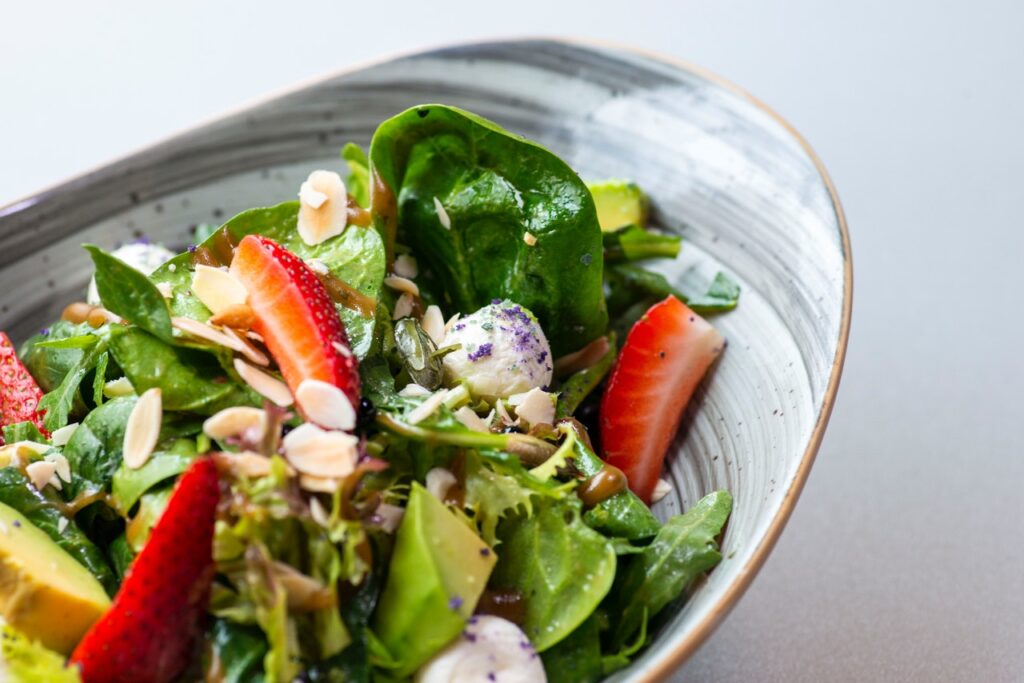
Personally, I love salads, and enjoy finding new ways to liven them up throughout the seasons. Fall salads, in particular, are some of my favorite – the ingredients that are in-season this time of year always bring such amazing flavor and texture to a bowl of leafy greens. I have a couple of great recipes up my sleeve, and of course, I have to share them with you!
But, before I share my three favorite fall salad recipes with you, I also wanted to share some of my go-to ‘pro’ tips for building the perfect salad. You’ll never eat a boring salad again:
- Always use a mix of greens – i.e. arugula + spinach, spring mix, kale + red lettuce
- Add fresh herbs, like basil, parsley, sage, cilantro, etc. to your salads for amazing flavor!
- Balance out all the flavors and textures – try to include something sweet, something bitter or acidic, something creamy, and something crunchy
- Make your own dressing!
- Don’t forget to season – salad deserves salt and pepper too (though you should save this until the very end)
Follow these tips, and you’ll never eat a bland salad again! And now, let’s get to my top three fall salad recipes.
What you’ll need…
Roasted Root Vegetable Salad – Serves 2-4 Individuals
- 4 cups mixed greens
- ¾ cup butternut squashed, peeled, cut into ½ inch cubes, and roasted in olive oil, salt, and pepper
- ¾ cup beets, peeled, cut into ½ inch cubes, and roasted in olive oil, salt, and pepper
- ½ cup goat cheese
- ¼ cup pumpkin seeds, roasted until golden brown
- Sage, diced, to taste
- For the dressing: 1/2 cup orange juice, freshly squeezed, 4 tbsps apple cider vinegar, 2 tbsp honey, 2 tbsp dijon mustard, salt and pepper (to taste), 2/3 cup olive oil
Autumnal Apple Salad – Serves 2-4 Individuals
- 4 cups spinach + arugula
- 1 cup apple, cut into ½ inch cubes
- ½ cup red onion, sliced
- ⅓ cup pecans, roasted until lightly browned
- 1/4 cup gorgonzola cheese
- Chives, sliced, to taste
- For the dressing: 1/2 cup balsamic vinegar, 2 tbsp honey, 2 tbsp olive oil, 1 tsp dijon mustard
Kale Power Salad – Serves 2-4 Individuals
- 4 cups kale + spinach
- ½ cup golden figs, sliced in half
- 1 cup acorn squash, sliced and roasted in olive oil, salt, and pepper
- ⅓ cup walnuts, roasted until golden brown
- ½ cup feta cheese
- For the dressing: 2 tbsp minced shallot, 1 clove garlic minced, 3 tsp Dijon mustard, 1 tsp salt, 1 tsp pepper, 2 tbsp honey, 3 tbsp apple cider vinegar, ½ cup oil (olive works well)
For all of these recipes, you’ll need to…
Begin by roasting the vegetables (butternut squash and beets in the first recipe, and acorn squash in the third recipe) in the oven at 375º F for 30 minutes, or until tender. While the vegetables are roasting, combine salad dressing ingredients in a bowl, whisk until well combined. Set aside.
When the vegetables are nearly done, roast the nuts in the oven at 375º F for no more than 3 minutes. If they still need some additional browning, leave them in the oven for another few minutes, checking often to make sure they don’t burn (this happens quickly!).

In a large bowl, add salad ingredients for each of these recipes, and toss together with dressing until well combined. Serve, and enjoy!
What do you think about salads? Whether or not you think salads are the best, you’ll have to let me know if you try one (or all) of these recipes! Send me an email at info@everbella.com!
Foods to Keep you Satisfied for Hours!
There is nothing more frustrating than eating, only to feel starving an hour later! It drives me crazy, and oftentimes, I struggle to feel satisfied…
Not too long ago, I learned that there’s more to healthy eating than just eating the right ingredients. It’s also important to consider our satisfaction with the food choices we make! Otherwise, if we aren’t satisfied, how can we expect to keep up healthy eating for the rest of our lives?
For me, satisfaction means two things:
- Every once in a while, I get to treat my sweet tooth. And…
- I don’t feel hungry all the time.
There are a few healthy eating strategies that I use for encouraging satiety (AKA fullness). They help me keep up on my smart food choices, AND they leave me feeling full, so I’m not mindlessly snacking to satisfy my hunger. Let’s get into it!
Stay Satisfied with Fiber
Fiber is essential for long-lasting satisfaction after meals. There are two main types of fiber – soluble and insoluble fiber. They both have important roles in the maintenance of our health, and in keeping us full and satisfied after meals! Let me explain the difference between these two types of fiber.
Soluble Fiber
This is the type of fiber found in oats, bran, seeds, legumes, and some fruits and veggies. It dissolves in our digestive system as it combines with other solids and liquids, and forms a gel-like substance that binds with other nutrients. This form of fiber offers a few different benefits:

- Soluble fiber binds with cholesterol and prevents it from being absorbed into the bloodstream (thereby preventing accumulation of unhealthy cholesterol in the body). Instead, it is excreted with the rest of your food waste!
- Soluble also can bind with other foods in your stomach, particularly carbohydrates. This can slow down the rate of stomach emptying and absorption of nutrients, which is helpful for controlling blood sugar!
- This slowed digestion also contributes to an extended feeling of fullness, which keeps us feeling satisfied after meals, for longer periods of time! [1]
Insoluble Fiber
You’ll find insoluble fiber in the skins of fruit, vegetables, beans, grains, and legumes (so leave the skins on as often as possible!). Insoluble fiber behaves a bit more differently than soluble fiber. Rather than dissolve into a gel, insoluble fiber maintains its structure. This affects our digestion in a few ways:
- Insoluble fiber can absorb lots of water, which creates a physical fullness. Meaning that water takes up a lot of space, and can give us that feeling of fullness.
- The added moisture and bulk to the food we digest can help aid digestion, and keeps us… Well, you know, regular. No complaints there! [1]
If you ever significantly increase the amount of fiber in your diet, you’ll want to make sure you increase your water intake. This will help you absorb and use the fiber to your benefit, otherwise you might experience a little extra gassiness and bloating.
Mix your Macros
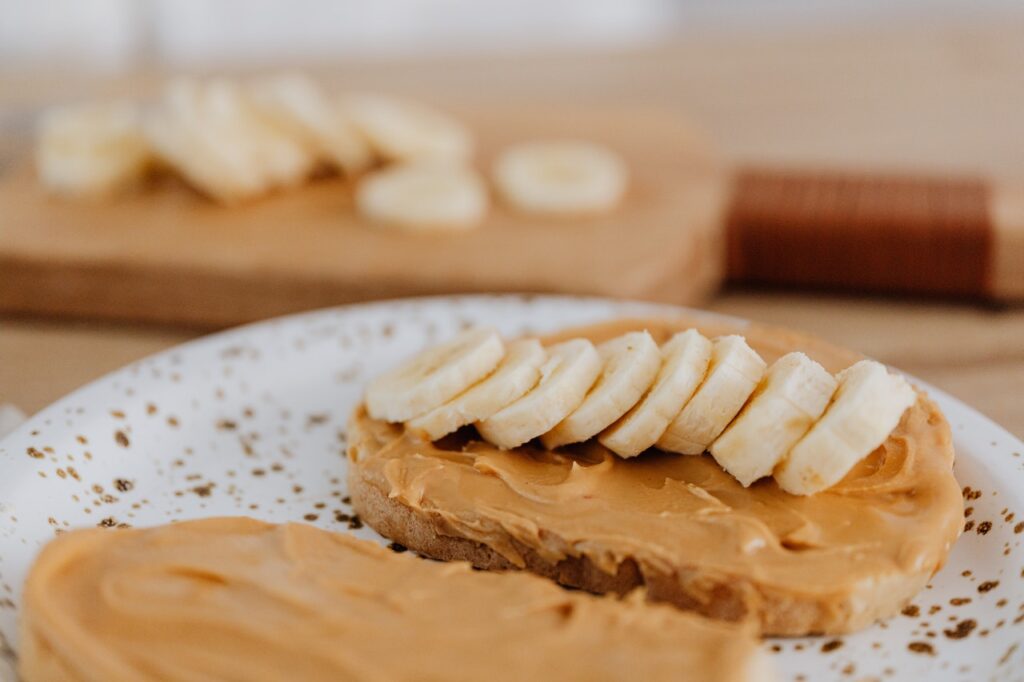
It’s always important to mix things up, especially when it comes to the macronutrient composition of your meals! When I say macronutrients, I mean the major nutrients that contain calories – carbohydrates, fat, and protein. Here’s how this can help your feelings of satiety and satisfaction…
Your body has to put in a lot of effort to digest and metabolize the food you eat. And different macros are digested and metabolized in different ways:
- Fat is digested slowly, which can definitely help keep you fuller, longer. However, on its own, high fat meals can leave you feeling sluggish and fatigued, and unsurprisingly doesn’t leave you feeling satisfied for very long. Studies have shown that fat alone actually has the least satiating effect, in comparison to carbs and protein. [2] So, it’s best to mix fats with other macros so you’re not feeling full in the next hour.
- All carbs are not created equal. Some carbs, complex carbs, contain a good amount of fiber, which can help keep you full (see above). However, simple carbohydrates have less ability to keep you satiated. These simple carbs usually cover sugars and sweeteners, like table sugar, brown sugar, coconut sugar, agave, honey, and corn syrup. Imagine staying full on just sugar. You can imagine why it’s not the most effective…
- Protein on its own may be the most satiating of the bunch, as dietary protein increases the production of fullness inducing hormones, and decreases the production of our hunger hormones. [3] However, you’ll extend your fullness and satisfaction even more by adding a little extra carb and fat here and there…
So mix your macronutrients! Don’t just eat a carb for breakfast, eat a carb plus a fat, or a carb plus a protein. Skip that high fat dinner, and opt for a more moderate mix of fat plus protein, or fat plus carbs! I think you can catch on at this point…
Adding at least two macronutrients to any meal is an easy, and healthy way to extend your satiety. Even after hours, you’ll still feel satisfied!
Collagen for Satiety
Have you ever heard that collagen may be helpful in promoting weight loss? There are a few reasons that collagen has taken on this reputation, but the simplest reason is related to its effect on satiety.
Ultimately, collagen is a protein. As I mentioned previously, protein may be more satiating because of its influence on satiety inducing hormones, and its suppression of hunger hormones. [3-4] So, after consuming a high protein food item, such as collagen, we may experience an increase in fullness after the meal. Improved satiety and satisfaction after meals can contribute to decreased caloric intake, which can lead to weight loss in some circumstances.
So, there you have it! Three actionable steps you can take today to help keep you satisfied and full, longer! Say goodbye to those hangry moods and mindless snacking, and fuel your body efficiently.
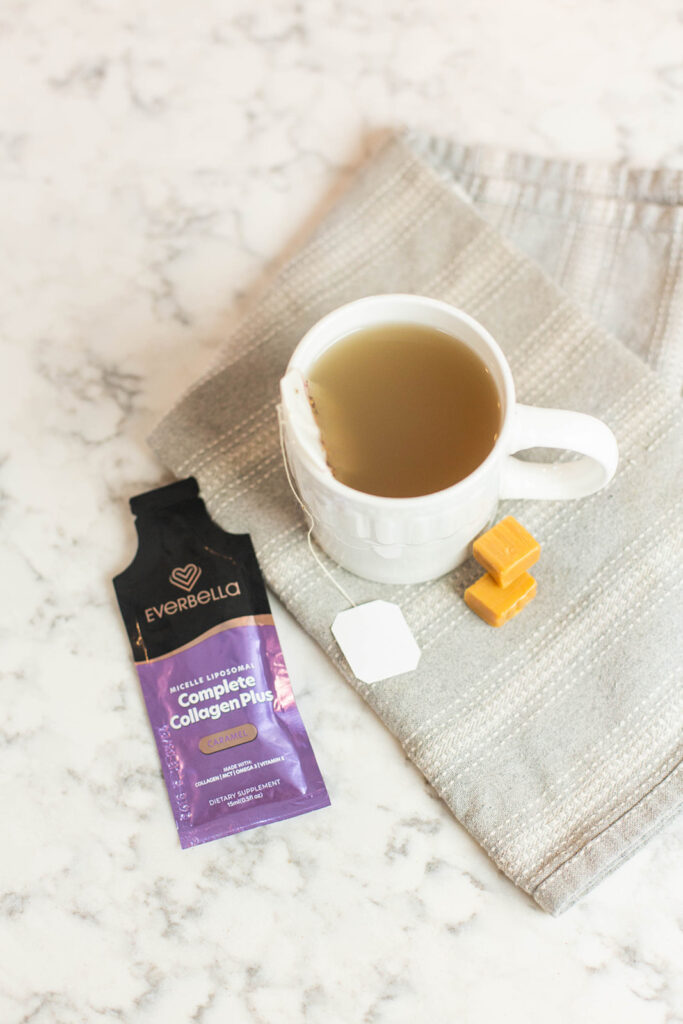
And if you’re searching for a high quality, highly absorbable collagen option… Complete Collagen+ is the way to go. You’ll love the rich caramel flavor (it’s perfect in my morning coffee), and all of its powerful benefits!
Try Complete Collagen+ risk-free, with our 180-day money back guarantee!
Citations
- Gardner, Amanda. “Dietary Fiber: Insoluble and Soluble Fiber.” WebMD, WebMD, 23 July 2015, https://www.webmd.com/diet/features/insoluble-soluble-fiber.
- Samra RA. Fats and Satiety. In: Montmayeur JP, le Coutre J, editors. Fat Detection: Taste, Texture, and Post Ingestive Effects. Boca Raton (FL): CRC Press/Taylor & Francis; 2010. Chapter 15. Available from: https://www.ncbi.nlm.nih.gov/books/NBK53550/
- Moon, Jaecheol, and Gwanpyo Koh. “Clinical Evidence and Mechanisms of High-Protein Diet-Induced Weight Loss.” Journal of obesity & metabolic syndrome vol. 29,3 (2020): 166-173. doi:10.7570/jomes20028
- Hochstenbach-Waelen, Ananda et al. “Single-protein casein and gelatin diets affect energy expenditure similarly but substrate balance and appetite differently in adults.” The Journal of nutrition vol. 139,12 (2009): 2285-92. doi:10.3945/jn.109.110403
Four Tips to Help with Damaged Hair
As I’ve learned how to care for my hair over the years, I’ve realized that there are so many things to consider. You know I talk about diet and nutrition all the time for healthy hair, but I don’t often talk about the way I care for my hair on a day-to-day basis aside from that.
The truth is, it’s been a lot of trial and error. I’ve overwashed it, I’ve underwashed it, I’ve tried dozens of different products, I’ve stopped using heat… Even still, I struggled with brittle and breakable hair.
It turns out, I was overcomplicating things. Let me share a few of my simplest hair tips that helped me prevent breakage and split ends, and left me with luscious and healthy hair!
Brushing Your Hair Wet
Your hair is weakest when it’s wet – wet hair tends to be stretchier and more elastic, which can result in easy breakage without care. This means that as you run a brush through your hair post-shower, there is great potential for damage!
For those with straight, thinner texture, brushing wet hair can cause stretching, breakage, and can even pull it right out of its root! This may result in signs of breakage and split ends when the hair dries. On the other hand, those with curly, more coarsely texture, know the challenges of trying to brush hair when it’s not wet. For these individuals, it can actually be safer for it to be brushed when it’s had a little hydration.
I know how annoying it can be to try and tackle tangles after your hair has dried. Which is why I have a couple of tips that might help ease your pain:
- Pre-brush your hair before you get into the shower
- Gently untangle your hair in the shower with your fingers
- Opt for a detangling conditioner or leave-in conditioner for after you hop out of the shower
- If you need to brush through some tangles while your hair is wet, very gently start at the bottom of your hair, and work your way up
You still might have to fight through some tangles later. However, it can greatly benefit your hair to practice a little patience, and to be incredibly gentle with your hair, especially while it’s wet.
Wrap Wet Hair in a Cotton T-Shirt Rather than a Towel
Because your hair is so vulnerable when it’s wet, it’s important to treat it as gently as possible. As our hair drips wet after a shower, many of us may opt to wrap it up in a heavy towel to soak up some of that extra moisture. However, this method of drying hair can actually cause further damage. This can happen for a couple of reasons.

I previously mentioned that our hair is more prone to damage while wet because it’s stretchier and more elastic. Now, imagine the weight of a heavy bath towel, pulling on our scalp and tugging at our hairs as they are twisted into a towel! It makes sense that this technique might actually be causing some damage. Additionally, the fibers in bath towels tend to be rough, and abrasive on hair. The hairs can catch on the rough fibers, and can easily be pulled from their follicle.
So, without a bath towel, how else can you dry your hair? Experts recommend that a soft, cotton t-shirt or small microfiber towel is the best way to soak up the extra water in your hair after a shower! You’ll still want to be gentle, but ultimately, these options will be much less abrasive as it dries. Avoid rubbing or ringing it too aggressively, and this will be a much safer option to protect the quality of your luscious locks.
Avoid Excessive Heat

Using heat on your hair is yet another way to cause damage, if you’re not careful. Using heat is not going to compromise itss health right off the bat, it’s the excessive use of heat, and excessive temperatures that can be the most problematic. Heat can cause the cuticle of our hair (the protective outer layer) to lose moisture, become brittle, and make it susceptible to damage.
Just like our skin needs to be protected from the heat of the sun, our hair needs to be protected from the heat of hot showers and styling tools. So, follow these tips if you want to prevent it from being fried!
- While a hot shower always feels amazing, turn down the temperature as much as you can bear when washing and rinsing your hair
- Always use a heat protectant spray before curling, straightening, or blow drying your hair
- Turn down the temperature of your styling tools – thinner and finer hair should aim to use a temperature below 380º, while thicker and more coarse hair can probably tolerate up to 400º
- If you use heat often, opt for a shampoo that is rich in protein to nourish the cuticle of your hair and protect it from heat damage
I used to crank my styling tools to the maximum temperature, but not anymore! And, I try to embrace my natural texture more often to give it a little bit of a break. Providing your hair just a little bit of protection can make all the difference in preventing damage.
Collagen
Of course, if you know my story, you know that collagen has been a game changer for my hair. In just 8 months of taking Complete Collagen+, my hair underwent a transformation. My dry, brittle, and thin hair bounced back, and it was obvious that it was thicker, healthier, and stronger than ever before.
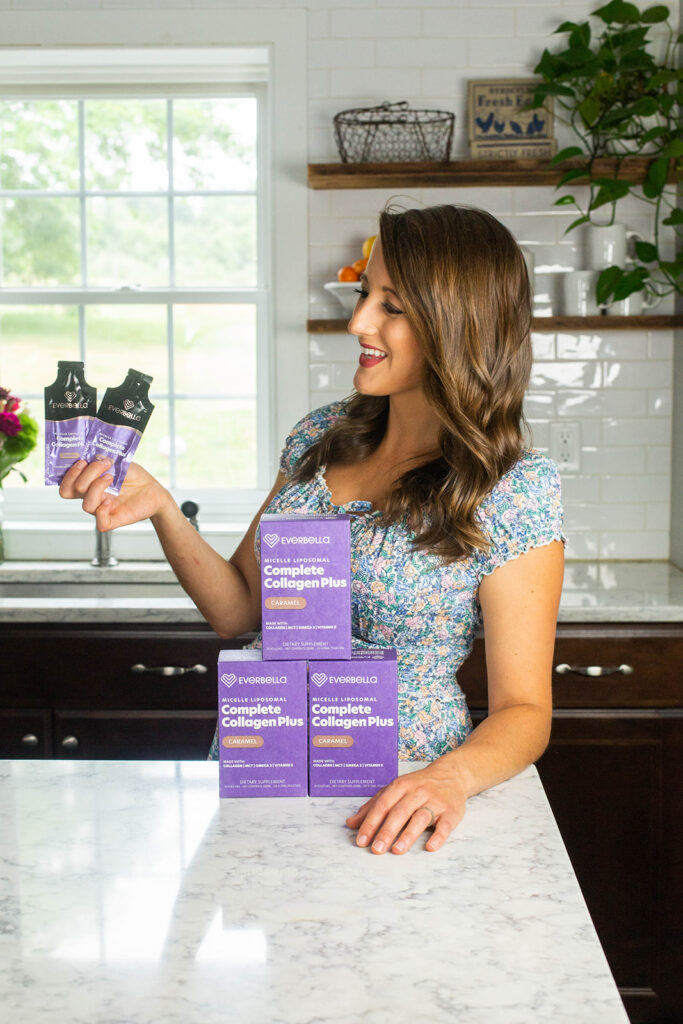
That’s because collagen is an important structural component of most of the tissues in our body, from our bones and skin, of course, to our hair! We need a lot of collagen to keep ourselves looking and feeling our best. And, considering that natural collagen production drops off around age 20, and continues to decrease over time, it’s important for us to continue to optimize our collagen intake as we age. [1]
After years of trying expensive product after product, I realized that I could be doing a whole lot more for my hair by doing less. By using these simple tips to protect it from damage, you could be on track for a transformation. And it doesn’t hurt to give yourself another boost with Complete Collagen+! Give your hair the love and nutrients it needs to thrive!
Citations
- “Collagen Synthesis.” Collagen Synthesis – an Overview | ScienceDirect Topics, https://www.sciencedirect.com/topics/engineering/collagen-synthesis.
DIY Soothing Chamomile Face Mask
Doesn’t it just feel good to treat yourself now and then? For me, I don’t need much – just a cozy blanket, candlelight, a good book, and some quiet time. Oh, and of course a good DIY face mask to treat my skin while I relax! There’s just nothing better!
There’s something relaxing about making my own face mask, too. It makes me feel so good to use natural ingredients. And it’s easy! Most of the time, I already have everything I need to make a DIY mask at home.
I love this chamomile face mask in particular, because it soothes my skin and is rich in nutrients. To make this recipe at home, you’ll need chamomile tea, honey, and nutritional yeast – and that’s it! Here’s how these ingredients work to benefit your skin:
Chamomile Tea
Chamomile tea is the perfect bedtime companion. While chamomile is typically known for its soothing and calming effects, it has even more benefits than you might think. Specifically, when it comes to the health of our skin, recent studies have suggested that drinking chamomile tea offers protection against inflammation!

In one study, patients with rheumatoid arthritis, an autoimmune inflammatory condition, experienced reduced inflammation after drinking chamomile tea. Those who did not drink the tea did not experience the same benefits. [1] This study, and others, have led us to believe that chamomile can benefit the skin with it’s anti-inflammatory properties. Additionally, chamomile is rich in antioxidants, which means that it can protect the skin and body against oxidative damage.
Honey
I love honey! I have it on hand at all times, which comes in handy when I want to make a face mask. Honey is a common ingredient you’ll see in DIY face masks because of its beneficial and therapeutic properties! It can benefit our skin in a few ways.
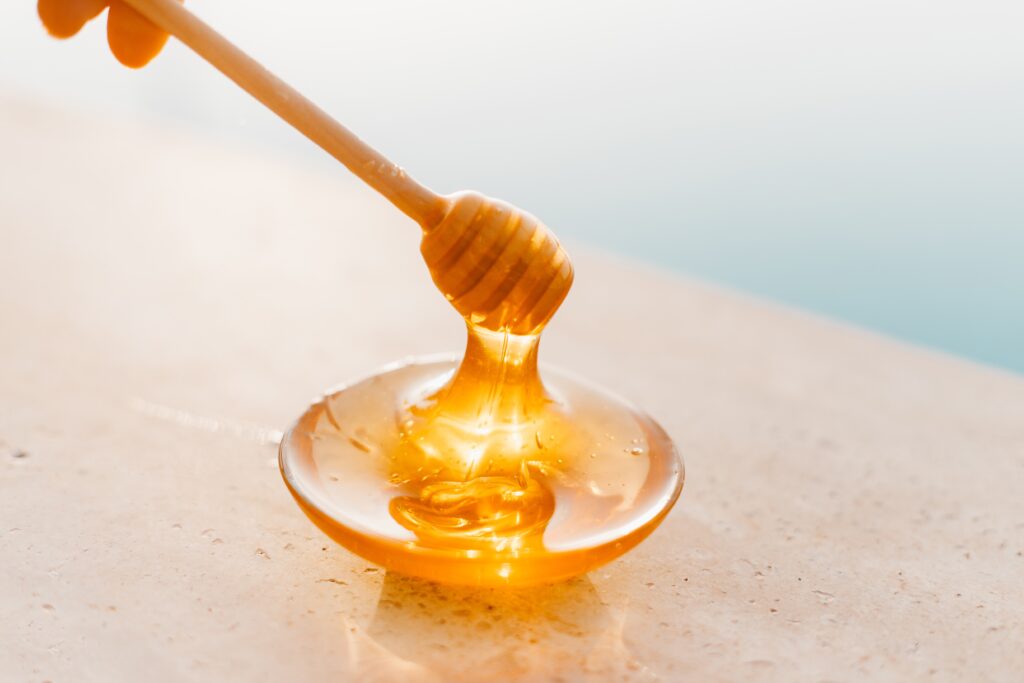
First, it is thought that honey has antimicrobial properties, which means it inhibits the growth of bacteria on our skin. Honey has been used for centuries for the purpose of healing and preventing infection. And now, there is research to demonstrate that this may have some merit. [1] This is why we can benefit from adding honey to our face masks – limiting the growth of bacteria on our face can help prevent breakouts!
Like chamomile, honey also is thought to offer anti-inflammatory and antioxidant benefits. [2] This can be beneficial for acne-prone and inflammation-prone skin types. Yet another reason why honey is a great ingredient for face masks!
Nutritional Yeast
Nutritional yeast is not an ingredient you see often in DIY skin masks, but it should be! It is absolutely packed with nutrients, and is a popular choice among vegans and vegetarians for this reason. Many of the nutrients that you might find lacking in a plant-based diet, you can find in nutritional yeast!
Additionally, it is rich in B vitamins, which are essential for our metabolism, as well as the health of our hair, skin and nails! Just one serving of nutritional yeast provides:
- 830% DV of vitamin B1 (thiamine)
- 780% DV of vitamin B2 (riboflavin)
- 350% DV of vitamin B3 (niacin)
- 680% DV of vitamin B6 (pyridoxine)
- 1000% DV of vitamin B12 (cobalamin) [4]
A reminder that % DV means percentage of the Daily Value of a nutrient. This number is based on the needs of an average individual, and is based on a standard 2,000 calorie diet. Depending on the individual, you may need more or less than the % Daily Value, but it can be a helpful reference point!
So, now let’s get to the fun part and make this face mask!
You’ll need to measure out:
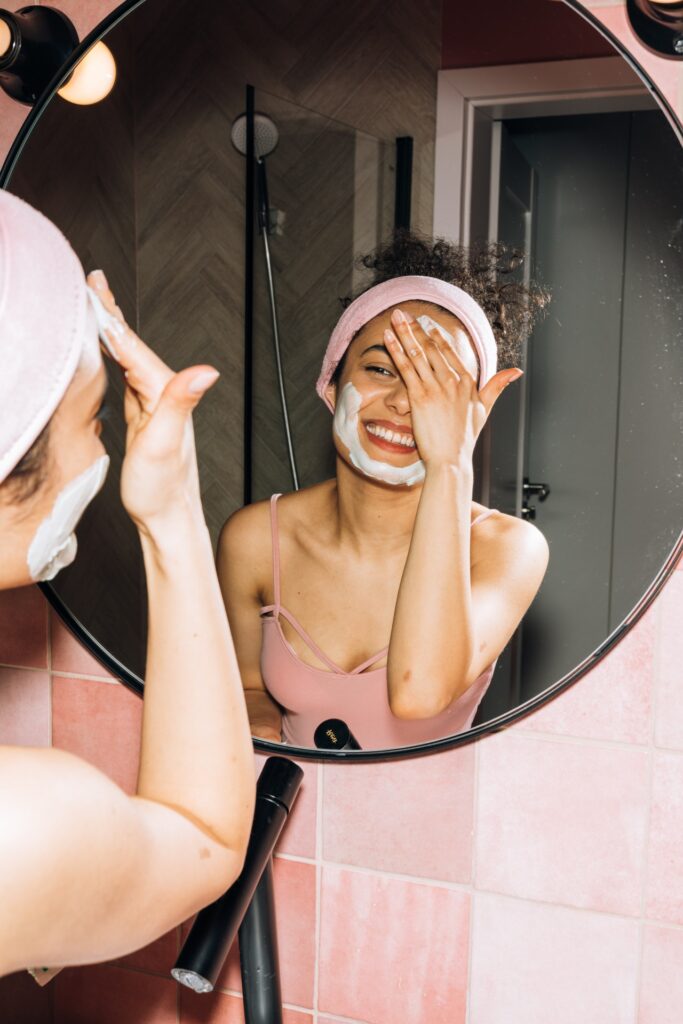
- 2 bags of chamomile tea
- 1 tablespoons of honey
- 1 teaspoon of nutritional yeast
To make this mask, start by brewing a cup of tea with the two teabags. Allow the tea to cool completely. Then, you’ll want to mix together the honey and nutritional yeast, before slowly adding some of the cooled tea. You’ll want to add enough so that it creates a thin paste, but isn’t entirely watery. Leave on your skin for 30 minutes before rinsing off with warm water!
And there you have it, the perfect, soothing face mask to treat yourself and nourish your skin. Give it a try! Oh, and I’d love it if you’d send me a picture of your best mask selfie at info@everbella.com. Happy relaxing!
Citations
- Pirouzpanah S, Mahboob S, Sanayei M, Hajaliloo M, Safaeiyan A. The effect of chamomile tea consumption on inflammation among rheumatoid arthritis patients: randomized clinical trial. Progr Nutr [Internet]. 2017 Oct. 23 [cited 2021 Nov. 3];19(1-S):27-33. Available from: https://www.mattioli1885journals.com/index.php/progressinnutrition/article/view/5171
- Mandal, Manisha Deb, and Shyamapada Mandal. “Honey: its medicinal property and antibacterial activity.” Asian Pacific journal of tropical biomedicine vol. 1,2 (2011): 154-60. doi:10.1016/S2221-1691(11)60016-6
- Samarghandian, Saeed et al. “Honey and Health: A Review of Recent Clinical Research.” Pharmacognosy research vol. 9,2 (2017): 121-127. doi:10.4103/0974-8490.204647
- “Fooddata Central Search Results.” FoodData Central, https://fdc.nal.usda.gov/fdc-app.html#/food-details/1991802/nutrients.
Radiate Beauty with the B Complex!
I’ve said it before, and I’ll say it again: when it comes to maintaining the health of our hair and skin, nutrition is key.

That’s because there are many nutrients we get from our diet that are essential for the maintenance of tissues with high cell turnover and regeneration – i.e. our hair and skin! Trust me, when it comes to beauty that radiates from the inside and out, a healthy diet will set you up for success.
There are a group of nutrients in particular that really make a difference in the health and appearance of hair and skin – the B complex, which is a combination of eight essential B vitamins. Today I will break down the B complex in a little more detail, so you can understand the difference between each of these B vitamins, and how they play a role in your physical health and appearance.
The B Complex
Eight essential vitamins make up the B complex: thiamine (B1), riboflavin (B2), niacin (B3), pantothenic acid (B5), pyridoxine (B6), biotin (B7), folic acid (B9), and cobalamin (B12). Let’s walk through the benefits of each of these vitamins, how deficiency impacts your health, as well as where you can find these vitamins in your diet.
B1 (Thiamine)
Thiamine is the first of the B complex vitamins. It maintains the health and function of our cells & promotes healthy nerve, brain, muscle, heart, stomach, and intestinal function. It’s also essential for our ability to convert carbohydrates into energy, which is essential for the health and survival of all the cells in our body. Thiamine only stays in the body for a short amount of time, so it’s important to be consistent about your daily intake or supplementation. [1]
Thiamine is an incredibly important vitamin for our overall wellness, and there is still much to be discovered about it’s relationship with the health of our hair and skin. One important animal study found that thiamine worked closely with collagen to promote healing after injury, which is another reason why it’s so important to maintain a healthy thiamine status. [2]
Food sources of thiamine include: whole grains, meat, fish, fortified foods like bread and cereals.
B2 (Riboflavin)
Next, we have riboflavin, or vitamin B2! Riboflavin is another B vitamin involved in energy production, cellular function, growth, and development. Which of course, is also an essential component in the turnover of skin cells and hair. While you may not notice the effects of having a healthy riboflavin status, you will certainly feel the effects of deficiency on your skin and hair health.
Riboflavin deficiency results in skin degradation, swollen and cracked lips, red, itchy eyes, as well as hair loss. Deficiency is rare, however, it’s important to know the symptoms and how they may affect your skin and hair health. [3]
Food sources of riboflavin include: Eggs, organ meats (kidneys and liver), lean meats, milk, some green veggies, and fortified foods.
B3 (Niacin)
Niacin, or vitamin B3, is an important vitamin for skin health, as well as energy production (are you starting to notice a trend?). There is also some research to support that niacin is important for reducing risk of cardiovascular disease, by improving lipid levels. [4] Niacin deficiency results in a condition called pellegra, and while rare, this condition can result in a dark and scaly skin rash, as well as inflammation of the tongue, fatigue, and memory problems. [4]
There is some evidence to support that one particular form of niacin, niacinamide, is particularly important for the health and appearance of our skin. In fact, nicinamide may benefit our skin in a variety of ways.
- Niacinamide promotes keratin production in our skin. Keratin is a protein that protects our skin and keeps it strong [5]
- It helps with inflammation, and can reduce redness in conditions such as eczema and acne. [5]
- Niacinamide may help improve fine lines and wrinkles in aging skin. [5]
Food sources of niacin include: Poultry, beef, fish, nuts, legumes, and fortified grains.
B5 (Pantothenic Acid)
Pantothenic acid is the next of the B complex vitamins, and is also an essential component of our metabolism. Specifically, it is important for the breakdown of fats, and the synthesis of essential fatty acids in our body. Dietary panthothenic acid is widely available in our diet. However, when it comes to skin and hair appearance, it’s usually found in synthetic forms. [6]
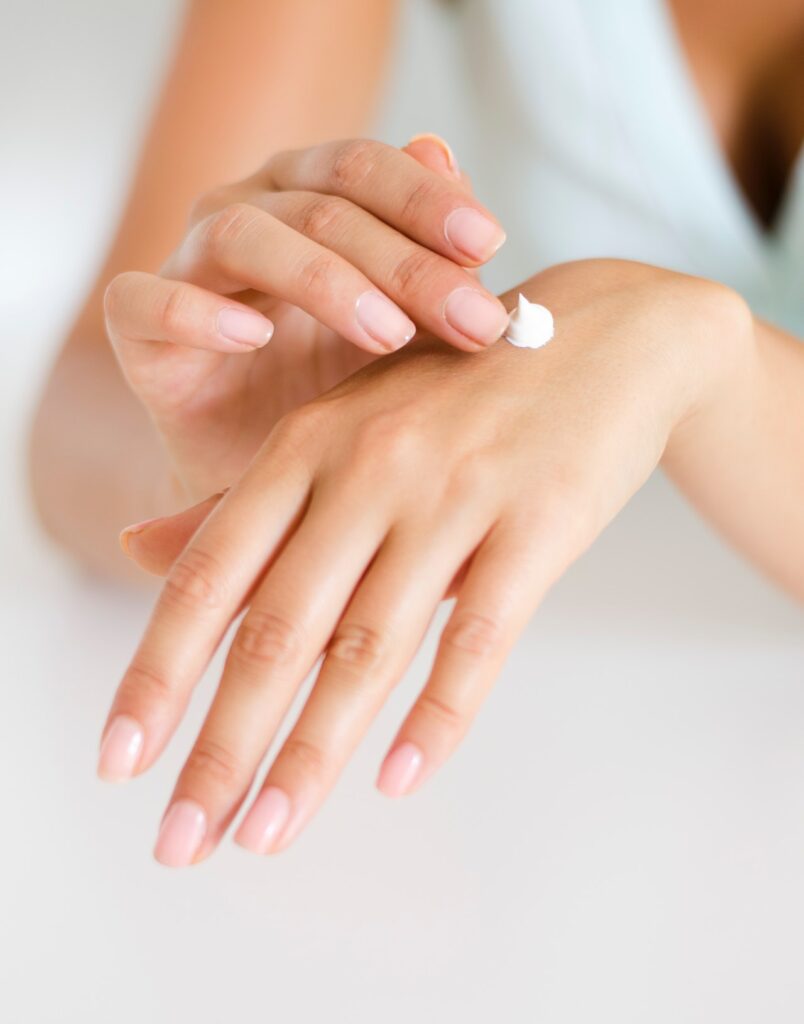
Many cosmetic products include a form of pantothenic acid called dexpanthenol, which helps to add moisture to the skin. Another form of B5, panthenol, is known to improve hair texture and sheen, and may also be effective in preventing acceleration of hair thinning. [7]
Food sources of pantothenic acid include: Beef, chicken, organ meats, whole grains, fortified foods, and some vegetables. It’s important to note that research indiciates that only 40-61% of B5 is absorbed from food. [6]
B6 (Pyridoxine)
Vitamin B6 is an essential B complex vitamin known to be involved in metabolism, particularly the metabolism of proteins. It’s also essential in the maintenance of our cognitive health, and is involved in the synthesis of neurotransmitters. Like some of the B vitamins on this list, it’s essential for the health of our skin. However, one may not notice until they’re deficient in B6.
Vitamin B6 deficiency is associated with dermatitis, scaling lips, cracks at the corners of the mouth, inflamed, swollen tongue, poor immune function, depression, and confusion. It’s important to make sure you’re getting enough B6 to prevent deficiency and associated decline in skin health. [8]
Food sources of pyridoxine include: Fish, beef liver and other organ meats, starchy veggies like potatoes, and non-citrus fruits
B7 (Biotin)
Vitamin B7, or more commonly known as biotin, is an essential nutrient for the metabolism of carbohydrates, proteins, and fats, and is also known to be useful for gene regulation and signaling between cells. Biotin deficiency can wreak havoc on your hair, skin, and nails. Symptoms may include rashes and leisions around your mouth and nose, skin infection, hair loss/thinning, and brittle, breakable nails. [9]
However, some studies have found that biotin supplementation in healthy individuals was associated with reduced hair loss and improved hair growth, though more research needs to be done. [10-11] Ultimately, it seems that preventing biotin deficiency is most important for the protection of your hair, skin, and nail health.
Food sources of biotin include: Organ meats, eggs, fish, meat, seeds, nuts, and sweet potatoes.
B9 (Folate)
Vitamin B9, also known as folate, is an incredibly important vitamin in the B complex. It is most well-known for its role in DNA synthesis. While essential for all, it is especially important for pregnant women, as folic acid deficiency is associated with neural tube defects in fetuses. Folate deficiency is also associated with megaloblastic anemia, sores in the mouth and on the tongue; changes in skin, hair, and fingernail pigmentation.

There has been research to suggest that folate is important for those who are living with autoimmune and inflammatory conditions, such as lupus, psoriasis, and rheumatoid arthritis. Folate supplementation may even be a treatment option for those with inflammatory skin conditions, such as psorisias. [12] Because folate is so essential for DNA synthesis, there is also some reason to believe that it can help improve the appearance of skin and hair by promoting healthy turnover of cells. [13]
Food sources of folate include: Dark green leafy vegetables, fruits and fruit juices, nuts, beans, peas, seafood, eggs, dairy products, meat, poultry, and grains
B12 (Cobalamin)
The last of the B complex vitamins is vitamin B12, sometimes referred to as cobalamin. Vitamin B12 often is regarded as one of the most important B vitamins. It is an essential component of the development and maintenance of the central nervous system, and is important for our neurological health. It also helps create and maintain the health of red blood cells, supports health division of DNA, and of course, helps maintain the integrity of our skin, nails, and hair. [14-18]
Deficiency of vitamin B12 is a little more common, as there are some groups of individuals who are at higher risk, such as: the elderly, vegetarians, those who have had gastrointestinal surgery, and those who have pernicious anemia. B12 deficiency may show up in a variety of ways, but can manifest in the skin and hair. Research has show that B12 deficiency may result in skin hyperpigmentation, weakness, fatigue, shortness of breath, tingly fingers, heart palpitations, vitiligo, mouth sores, and hair changes. Even if you are getting enough vitamin B12 through your diet, it may still be wise to supplement. [19]
Food sources of B12 include: Fish, meat, poultry, eggs, dairy products, fortified grains, and nutritional yeast.
Phew. That was a lot of information to cover, but it’s important to know how the B complex vitamins can affect your overall health! Even though there are plenty of ways to get the B complex from your diet, it can be challenging to make sure all your bases are covered. The good news is that I know of a great product that will have you completely covered when it comes to the B complex! You’ve got to try Purality Health’s Micelle Liposomal Active B Complex. Like Complete Collagen+, this supplement was designed specifically with absorption in mind. You can try it risk free for 180 days with Purality Health’s money back guarantee!
Citations
- “Office of Dietary Supplements – Thiamin.” NIH Office of Dietary Supplements, U.S. Department of Health and Human Services, https://ods.od.nih.gov/factsheets/Thiamin-HealthProfessional/.
- Alvarez, O M, and R L Gilbreath. “Effect of dietary thiamine on intermolecular collagen cross-linking during wound repair: a mechanical and biochemical assessment.” The Journal of trauma vol. 22,1 (1982): 20-4. doi:10.1097/00005373-198201000-00005
- “Office of Dietary Supplements – Riboflavin.” NIH Office of Dietary Supplements, U.S. Department of Health and Human Services, https://ods.od.nih.gov/factsheets/Riboflavin-HealthProfessional/.
- “Office of Dietary Supplements – Niacin.” NIH Office of Dietary Supplements, U.S. Department of Health and Human Services, https://ods.od.nih.gov/factsheets/Niacin-HealthProfessional/#h5.
- Gehring, W. “Nicotinic acid/niacinamide and the skin.” Journal of cosmetic dermatology vol. 3,2 (2004): 88-93. doi:10.1111/j.1473-2130.2004.00115.x
- “Office of Dietary Supplements – Pantothenic Acid.” NIH Office of Dietary Supplements, U.S. Department of Health and Human Services, https://ods.od.nih.gov/factsheets/PantothenicAcid-HealthProfessional/.
- Davis, M G et al. “A novel cosmetic approach to treat thinning hair.” The British journal of dermatology vol. 165 Suppl 3 (2011): 24-30. doi:10.1111/j.1365-2133.2011.10633.x
- “Office of Dietary Supplements – Vitamin B6.” NIH Office of Dietary Supplements, U.S. Department of Health and Human Services, https://ods.od.nih.gov/factsheets/VitaminB6-HealthProfessional/.
- “Office of Dietary Supplements – Biotin.” NIH Office of Dietary Supplements, U.S. Department of Health and Human Services, https://ods.od.nih.gov/factsheets/Biotin-HealthProfessional/#h4.
- Glynis Ablon, “A 3-Month, Randomized, Double-Blind, Placebo-Controlled Study Evaluating the Ability of an Extra-Strength Marine Protein Supplement to Promote Hair Growth and Decrease Shedding in Women with Self-Perceived Thinning Hair”, Dermatology Research and Practice, vol. 2015, Article ID 841570, 8 pages, 2015. https://doi.org/10.1155/2015/841570
- Glynis, Ablon. “A Double-blind, Placebo-controlled Study Evaluating the Efficacy of an Oral Supplement in Women with Self-perceived Thinning Hair.” The Journal of clinical and aesthetic dermatology vol. 5,11 (2012): 28-34.
- “Office of Dietary Supplements – Folate.” NIH Office of Dietary Supplements, U.S. Department of Health and Human Services, https://ods.od.nih.gov/factsheets/Folate-HealthProfessional/.
- Gisondi, Paolo et al. “Folic acid in general medicine and dermatology.” The Journal of dermatological treatment vol. 18,3 (2007): 138-46. doi:10.1080/09546630701247930
- Institute of Medicine, Food and Nutrition Board. Dietary Reference Intakes for Thiamin, Riboflavin, Niacin, Vitamin B(6), Folate, Vitamin B(12), Pantothenic Acid, Biotin, and Choline. Washington, DC: National Academies Press; 1998.
- Carmel R. Cobalamin (vitamin B12). In: Ross AC, Caballero B, Cousins RJ, Tucker KL, Ziegler TR, eds. Modern Nutrition in Health and Disease. 11th ed. Baltimore, MD: Lippincott Williams & Wilkins; 2014:369-89.
- Allen LH. Vitamin B12. In: Coates PM, Betz JM, Blackman MR, et al., eds. Encyclopedia of Dietary Supplements. 2nd ed. London and New York: Informa Healthcare; 2010:812-20.
- Allen LH. Vitamin B-12. Adv Nutr 2012;3:54-5. [PubMed abstract]
- Stabler SP. Vitamin B12. In: Marriott BP, Birt DF, Stallings VA, Yates AA, eds. Present Knowledge in Nutrition. 11th ed. Washington, DC: Elsevier; 2020:257-71.
- “Office of Dietary Supplements – Vitamin B12.” NIH Office of Dietary Supplements, U.S. Department of Health and Human Services, https://ods.od.nih.gov/factsheets/VitaminB12-HealthProfessional/#h5.
